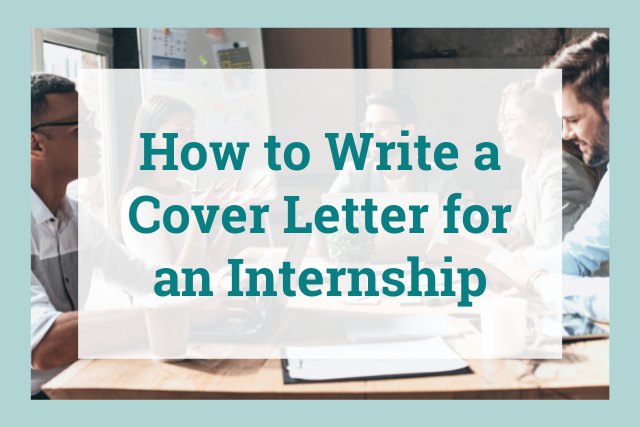
Writing a cover letter is one of the most important parts of the job search process. Your cover letter is your chance to tell a company why they should hire you.
A successful cover letter can score you an invitation to interview, while a weak cover letter can get you automatically rejected.
If you’re applying for an internship, writing a cover letter can be an especially daunting task, because you likely have little work experience in the field you’re applying to.
Don’t worry—you don’t need work experience to snag the internship of your dreams.
The purpose of the cover letter is to tell your story. And you definitely have a story to tell, even if you’re new to the industry.
In this article, I’ll teach you how to write a strong internship cover letter, regardless of how much work experience you have.
What Is the Purpose of an Internship Cover Letter?
First, let’s start by clarifying the goal. Why is your potential employer asking you for a cover letter?
Employers ask for cover letters to see if you’ll be able to succeed in the role you’re applying for.
The purpose of the cover letter isn’t just to tell the company a list of facts about yourself. Usually, your resume will already give the hiring manager an overview of your experience and skills—you don’t need to rehash those accomplishments.
Instead, the purpose of the cover letter is to tell a story that proves you can succeed in the role and add value to the company.
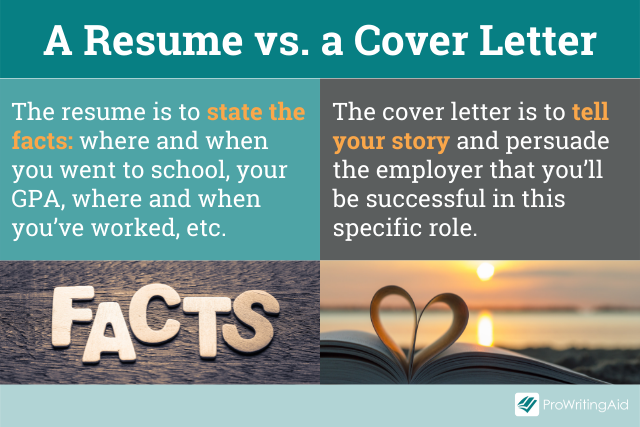
So how do you find that story?
Let’s break the process down into simple steps.
What Can I Include in My Cover Letter if I Have No Work Experience?
Don’t worry, most other internship applicants won’t have much experience, either. That’s what the internship is for—to give you some work experience for your next cover letter.
So what should you include in your cover letter?
Well, you might not have work experience yet, but you do have other relevant experience.
More likely than not, your classes and extracurriculars have taught you important skills that will make you a successful intern.
The key is in figuring out which of your past experiences translate most strongly to the value you can bring to the company.
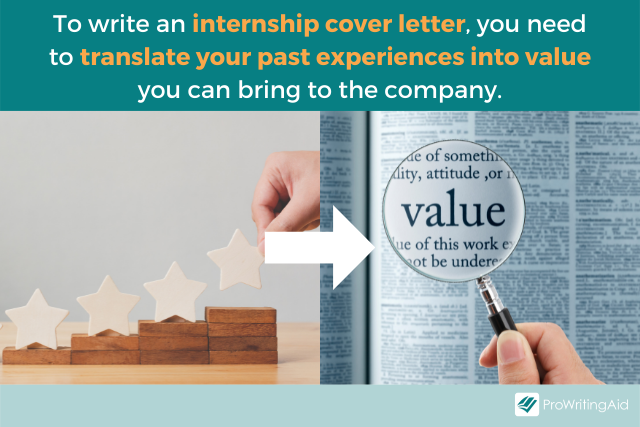
Even if you’ve worked in the industry before, you can still follow these steps to find the right story to show your worth.
How Do I Demonstrate My Suitability for an Internship Role?
Step 1: Research a List of Ways Your Role Brings Value to the Company
First, think about what the company needs from an intern.
You can refer to the job description, the company mission statement, the company website, and even news articles about the company to get a sense of what they need.
Knowing what they need from your role is crucial for proving you’re the right candidate to deliver those things.
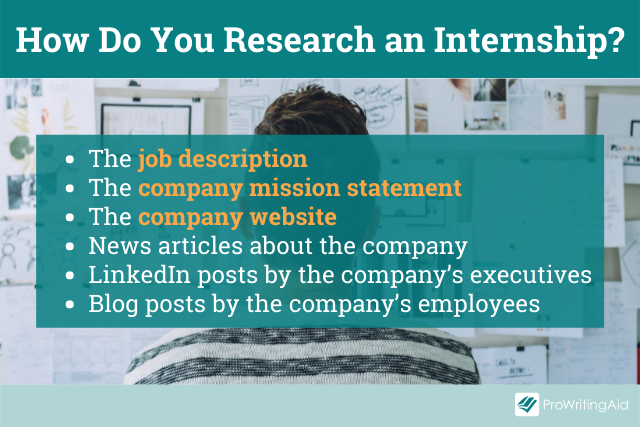
For example, say you’re applying for an analyst internship at a consulting company.
An example list of what the consulting company wants from your role might look like this:
- Work with clients to understand and meet their needs
- Analyze data and conduct market research
- Present slide decks summarizing analyses
Or, say you’re applying for an editorial internship at a publishing company.
An example list of what the publishing company wants from your role might look like this:
- Revise stories and articles produced by writers
- Collaborate with other team members, including senior editors and project managers
- Work on a tight schedule to meet publishing deadlines
What Skills Do I Need for an Internship?
Step 2: Break Down Each Item on Your List into Specific Skills
Once you have your list of potential tasks, it’s time to tie those tasks to skills.
Every task can be broken down into specific skills. Thinking about skills, rather than the job itself, will make it easier to figure out which of your past experiences are relevant for the internship.
For example, think about the skills required to deliver a pizza. You need to operate a vehicle, communicate with a team, manage your time effectively, and present a friendly face to customers.

For the consulting internship, you might break down the skills like this:
- Work with clients to understand and meet their needs → empathy, friendliness, communication
- Analyze data and conduct market research → math, logic, Excel
- Present slide decks summarizing analyses → public speaking, rhetoric, PowerPoint
For the publishing internship, you might break down the skills like this:
- Revise stories and articles produced by writers → editing, writing, storytelling
- Collaborate with other team members, including senior editors and project managers → teamwork, communication, integrity
- Work on a tight schedule to meet publishing deadlines → initiative, organization, time management
How Do I Communicate My Skills in an Internship Cover Letter?
Step 3: Brainstorm Times You’ve Demonstrated Those Specific Skills in Academic, Extracurricular, and Work Settings
When you think of a role in terms of the specific skills required, you might find that you have done many things in the past that have prepared you to do this internship, even if you’ve never worked before.
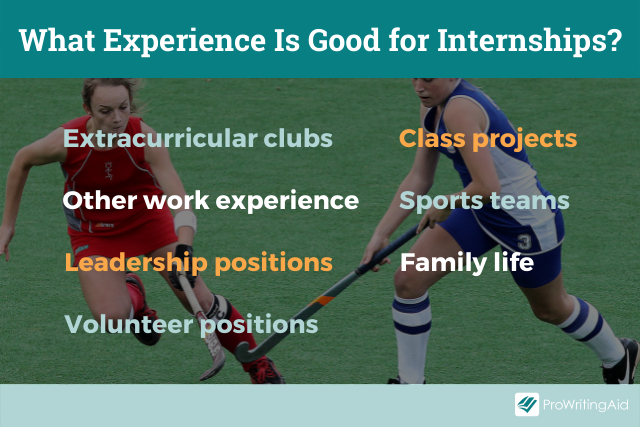
For the consulting internship, your list might look like this:
- Empathy, friendliness, and communication: I volunteer for a local grassroots organization where I communicate and empathize with strangers
- Math, logic, and Excel: I’ve done several school projects for which I’ve used Excel and other quantitative skills
- Public speaking, rhetoric, and PowerPoint: I was on a high school speech and debate team where I practiced public speaking
For the publishing internship, your list might look like this:
- Editing, writing, and storytelling: I co-host a radio podcast for which we write and edit stories
- Teamwork, communication, and integrity: I play for my school’s basketball team, where I have to coordinate closely with others and learn to work as a team
- Initiative, organization, and time management: I plan and organize for my sorority
Should I Link My Cover Letter to My Resume?
Step 4: Pick a “Star Story” That You Can Highlight in Both Your Cover Letter and Your Resume
Look at your list of experiences from Step 3.
Think about what they say about you. Do they show that you’re smart? Do they show that you’re collaborative? Do they show that you take initiative?
Pick the experience that does the best job of explaining why you’d be suited for the role you’re applying to.
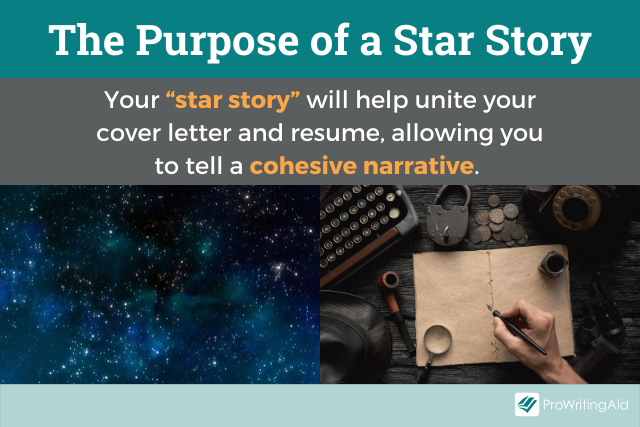
Now, figure out the best way to tell that story. This brainstorm will become your “star story”—the story that serves as the main highlight for both your cover letter and your resume.
For the consulting internship, your story might look like this:
In my Financial Studies class, I led a two-month-long team project to develop detailed case studies on governmental responses to financial crises. I used Excel and Stata to build statistical models to evaluate the short-run and long-run consequences of government responses. At the end of the quarter, I presented the team’s results to our classmates and professors.
For the publishing internship, your story might look like this:
I co-host a radio show called “True Stories at UCLA,” where we explore a different story each week about the life of someone on campus. I write and edit all our scripts on a tight deadline. The experience has taught me how to interact with a wide variety of people, how to think on my feet, and how to present my ideas effectively.
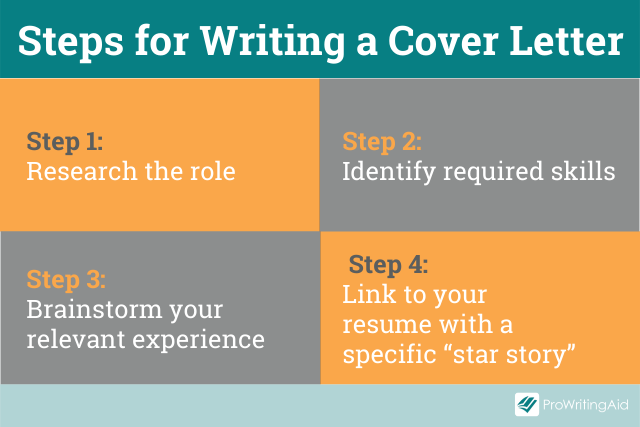
Now that you know what to include in your cover letter, it’s time to write.
How Should I Structure My Internship Cover Letter?
Your cover letter should be between 250 and 400 words. It should all fit on a single page.
With a cover letter, less is more. Presenting a strong impression of yourself with only a few words is more impressive than presenting a mediocre impression of yourself with several rambling pages.
A standard structure is to divide your cover letter into four paragraphs.
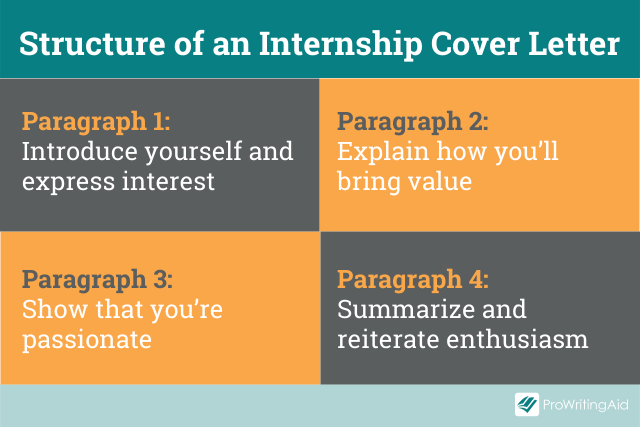
First Paragraph: Introduce Yourself and Express Interest in the Position
In the first paragraph, give a brief introduction of yourself. If you’re a student, tell them what school you go to and where you study.
Then, state the role you’re applying for, and give an overview of why you’d be a good fit for this role.
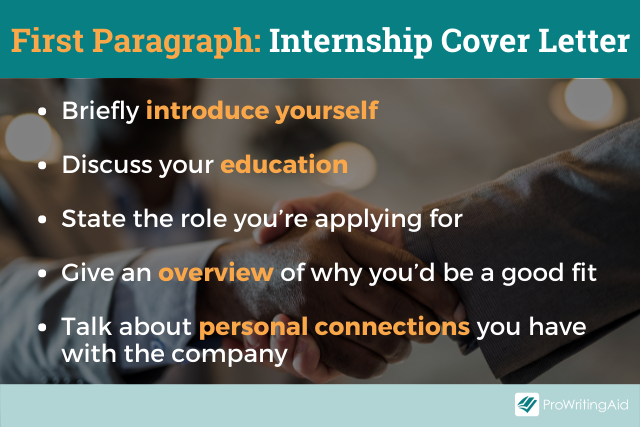
If you have any personal connection with this company, you can also state that in the first paragraph.
Examples of this are if you met representatives of this company through a job fair at your school, or if you’ve been using this company’s products since you were a kid.
That personal connection can show that you know the company and have a specific reason for applying.
Second Paragraph: Tell Your “Star Story” to Show How You’d Bring Value to the Company
The second paragraph is where you include your “star story”: the story you want the hiring manager to remember about you.
Describe what you accomplished and give details about what you learned in the process.
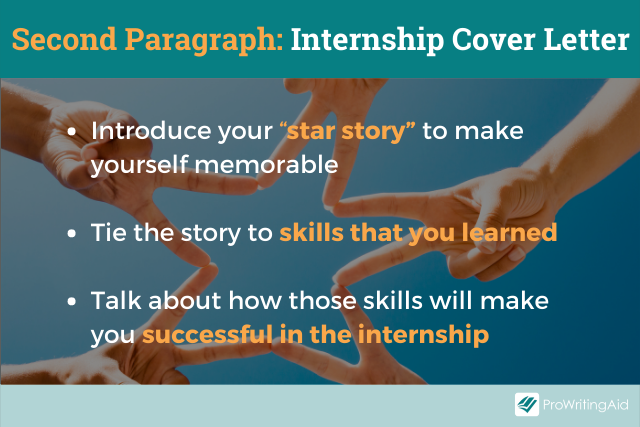
Tie that story explicitly to the skills you learned from the experience, and how those skills will make you successful in this internship.
You can even use or paraphrase the same language the company used in the job description.
Third Paragraph: Show That You’re Passionate About the Company
In the third paragraph, describe why you’re passionate about this internship and why you think you’d be a good fit for the company culture.
Hiring, like dating, is a two-way street. Even if the hiring manager is already convinced you’d be a good candidate, they have to know you’re interested in them too.
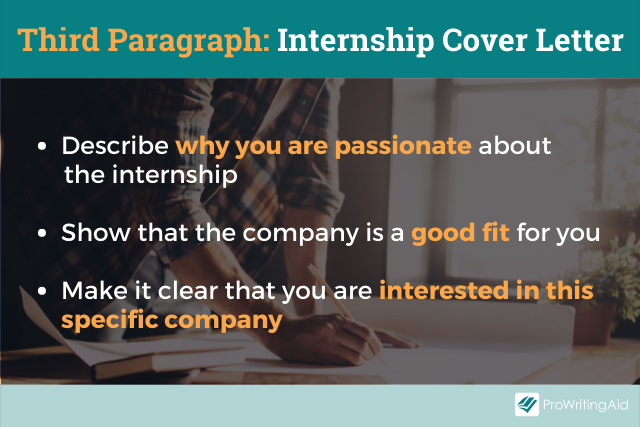
The second paragraph was your chance to show that you’re a good fit for the company, while the third paragraph is your chance to show that the company is a good fit for you.
Fourth Paragraph: Conclude with a Summary and a Reiteration of Your Enthusiasm
In the last paragraph, summarize the reasons why you think you’d be a fantastic fit for this role.
Conclude with a polite and professional expression of gratitude, such as “Thank you for your time and consideration” or “I look forward to hearing from you.”
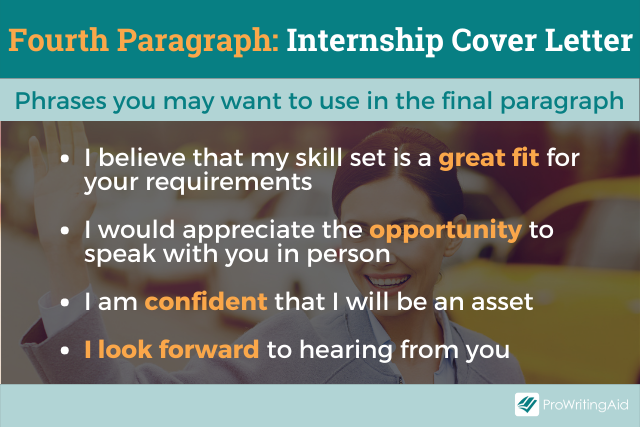
What Are the Best Internship Cover Letter Examples?
Let’s look at a sample cover letter for each of the examples we used above.
Cover Letter Sample for a Consulting Internship
Dear Hiring Manager,
I am a sophomore at the University of Washington, pursuing a degree in economics. I first learned of ProConsulting at a campus networking event, where I was impressed by ProConsulting’s creative approaches to research and analysis. I am writing to apply for the summer internship position in your Seattle office.
My classes at the University of Washington have given me exceptional opportunities to develop my consulting skills. In my Financial Studies class, for example, I led a two-month-long team project to develop detailed case studies on governmental responses to financial crises. I used Excel and Stata to build statistical models to evaluate the short-run and long-run consequences of government responses. At the end of the quarter, I presented the team’s results to our classmates and professors. This experience equipped me with the analytical and presentation skills that are integral for research at ProConsulting.
I would love to work at your company because ProConsulting not only delivers essential analysis at a deeper level, but also engages with a variety of topics I care deeply about, such as the economics of media, the internet, and intellectual property. I admire the impact of ProConsulting’s research and would love the opportunity to contribute to this research.
With my robust analytical skills and my commitment to the values shared by your firm, I am confident that I would be a strong contribution to your team. I welcome the opportunity to speak with you about my qualifications and the ways that we can put my skills to work for ProConsulting. Thank you for your consideration, and I look forward to hearing from you.
Sincerely,
[Your name]
As you will notice in the above example, there are many complex terms, but the letter is still very easy to read.
If a hiring manager has 100 applications, they may only scan your letter before deciding if it is worth reading.
Complex and wordy sentences may put them off meaning that they delete your application without realizing that you are a viable candidate.
Reduce the risk of this happening to you by using ProWritingAid’s Readability Checker. It highlights parts of your document which could be simplified without changing the overall meaning.
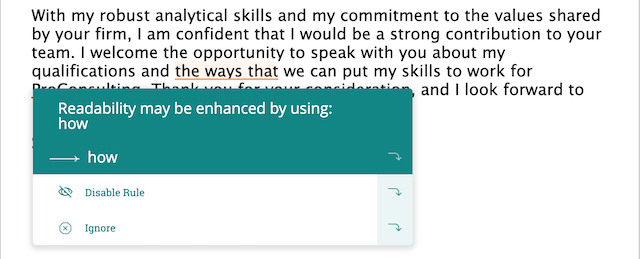
Check your cover letter’s readability with a free ProWritingAid account.
Cover Letter Sample for a Publishing Internship
Dear Hiring Manager,
I am a junior at UCLA, pursuing a degree in English. I’ve been reading books published by ProPublishing since I was a child, and I’d love to work here to help bring those books to life. I saw this job posting on my school's website, and I’m writing to apply for your company’s editorial internship position in the New York office.
I co-host a radio show called “True Stories at UCLA,” where we explore a different story each week about the life of someone on campus. I write and edit all our scripts on a tight deadline. The experience has taught me how to interact with a wide variety of people, how to think on my feet, and how to present my ideas effectively. Most importantly, through the feedback we receive from our readers, I have experienced first-hand the importance of quality, reliability, and integrity.
I’ve always wanted to work in the publishing industry, and I deeply admire the way ProPublishing brings true stories to life in a way that’s respectful, authentic, and deeply engaging. I would love the chance to start my career as an intern at ProPublishing.
With my strong writing experience and my passion for storytelling, I am confident that I could be a successful employee on your team. I welcome the opportunity to speak with you about my qualifications and the ways that we can put my skills to work for ProPublishing. Thank you for your consideration, and I look forward to hearing from you.
Sincerely,
[Your name]
Are Cover Letters Still Necessary?
Even if the hiring manager never reads your cover letter, including one with your resume shows that you are passionate about the role. And if other candidates have included a cover letter and you haven't, it could make your application stand out for the wrong reasons.
So there you have it: a step-by-step guide for writing an internship cover letter.
Let us know in the comments if you found these steps useful. Good luck with your internship search!


